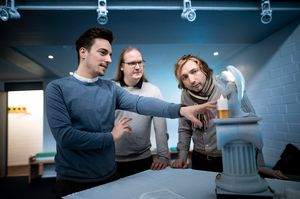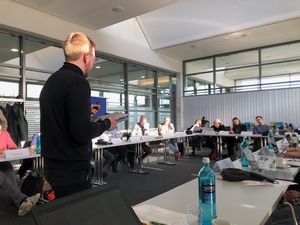- Sie sind hier:
- Startseite
- Promovierende
- Förderprogramme zur Internationalisierung
- Project International Event
- Funded International Events
- Robot, pray for me! Robots as Instruments of God?
Robot, pray for me! Robots as Instruments of God?
Explorations in Robotics and Theology
The workshop discussed religious robots at the interface of systematic and practical theology. Prior to the workshop, the prayer robot CelesTE, built by our invited speaker Gabriele Trovato, was exhibited at the university pastoral care project CampusSegen and drew a lot of attention to our research and the Ruhr-University. The workshop provided an opportunity to discuss the use of new technologies in religious practice and to develop new concepts for this field. In response to the call for papers, the attached program was put together, addressing four different topics ranging from robot design to robot eschatology. Additionally, we had keynotes by Gabriele Trovato (Japan) and Ilona Nord (Würzburg), as well as an opportunity to analyse CelesTE in the aforementioned setting. Noreen Herzfeld (USA), whom we had invited to give a presentation, got sick prior to our workshop and therefore could not attend. All in all, more than twenty participants from Germany, Austria, the Netherlands, Denmark, Great Britain, and Japan attended the workshop, providing different viewpoints from various religious contexts and scientific disciplines, from theology to neuro- and computer science.
The workshop confirmed various points at the interface of theology and robotics and consistently adopted an interdisciplinary perspective between systematic and practical theology: Theologians are currently underrepresented in robot design. Nevertheless, the workshop provided an opportunity to get to know and try out various digital tools for religious practice that are being developed by theologians and awakened the pioneering spirit of the participants immediately. Overall, theologians should engage more strongly in discourse with engineering and computer science disciplines. Insofar as these disciplines produce cultural objects, they inevitably refer to religious experiences of the users. At the same time, the examples examined clearly show that religious technology, especially when it addresses global phenomena such as aging, inevitably reaches out to a global and diverse audience. As a result, the religious values of the respective context of origin are confronted with the religious expectations and prejudices of different parts of the “Weltkirche”. Practical-theological competence is therefore needed for cultural adaptation. The relevance of the theological perspective was underlined by the fact that developments that address religious contexts initially emerge independently of religious affiliations, though addressing existential contexts such as death and mourning. Though initial test runs have shown that “religious” devices are indeed perceived and accepted as spiritual companions, the requirements that set the standard for the complex profile of, for example, pastoral workers must not be overlooked.
It became clear that different topics regarding the comparison of humans and machines must be addressed from the systematic-theological perspective, for they form a significant framework for practical-theological investigations. We found, that the ontological distinction from humans defined by the purpose of the machine and its practically immortal life cycle is a more fruitful approach than the speculation about its possible consciousness. Through interaction with smart technical systems, human self-perception (both positive and negative) is repeatedly challenged. Religious education gains importance as a place for reflected engagement with existential questions in the identity development of young people. Finally, engagement with science fiction can make an important contribution to philosophical-theological discourse. For example, the question of a heaven for robots extends the soteriological question of the need for redemption of creation intelligently to the non-natural creation of humans, including the technology that accompanies, supports, or even expands human abilities.
Theology is also well-advised to take an interreligious perspective regarding the questions of religious robotics, for other religions provide individual experiences and background in this area. Fortunately, the Islamic theological and philosophical perspective was represented at the workshop by two Islamic scholars from Erlangen and Vienna. Considering that technical development has taken root in the Islamic world for a long period of time before it grew in Christian Europe, it makes sense to seek out these conversation partners. Consistently, in the future, we will seek to attract members from Jewish and Orthodox backgrounds as well as from Eastern religions to our workshops alike.
The EKD provided additional funding for the publication of an anthology, that will gather the results of the workshop and will be published in 2024. For us and our research, the workshop was a success. We are already planning to repeat the format as a summer school in 2024 and to open it up even more to students in theology, engineering, and computer science.
Insights and reviews from the participants
- #nethKI2023 auf Twitter
- Theonet: Religion and Robotics: Insights from the „Robot, Pray for Me!“ Conference 28th March 2023: The „Robot, Pray for Me!“ conference, held on 16th though 17th March 2023 at Ruhr-University Bochum, explored the complex relationship between robots, theology, and religious practices. This interdisciplinary event brought together scholars to present their research projects, addressing the intersection of religion and robotics. The conference facilitated networking among participants and experts, fostering meaningful conversations on the relationship between humans, machines, and religious practice.
Presscoverage
The Ruhr University and the Diocese of Essen formulated their own press releases on the installation of CelesTE and the workshop. Different media reported on the event before, during and after the workshop.
- Wiener Zeitung: Robotersegen - nicht allen gelegen Easter, April, 9th 2023: Von Celeste bis BlessU-2: Die Avantgarde christlicher Theologie-Robotik ist umstritten.
- CIG: Himmelsmaschine March 26th 2023: „Celeste“ (himmlisch) lautet der Name eines Gebetsroboters, der im Zuge eines internationalen Workshops über digitale Glaubenshelfer an der Bochumer Ruhr-Universität begutachtet und getestet wurde.
- RTL West: Beten mit Roboter March 23rd 2023: In einigen Bereichen gibt es schon Roboter. Jetzt wird über den Einsatz in Kirchen gesprochen. Der Gebets-Roboter „Celeste“ war zu Besuch in Bochum.
- WDR5: Diesseits von Eden March 18th 2023: Bet-Roboter CelesTE in Bochum. Als Teaser direkt zu Beginn und mit einem Beitrag ab 00:29:45.
- WAZ: Wenn der Gebets-Roboter auf Knopfdruck über Liebe spricht March 16th 2023: „Roboter, bete für mich!“ Bochumer Theologen erkunden Beziehung zwischen Religion und Robotik. In Seniorenheimen ist Celeste schon im Einsatz.
- DLF: Roboter, bete mit mir! March 15th 2023: Künstliche Intelligenz macht auch vor der religiösen Praxis nicht halt: „Celeste“ heißt ein Bet-Roboter an der Ruhr-Universität Bochum. Der hilft nicht nur beim Gebet, sondern gibt auch Ratschläge.
- Bistum Essen: Wenn dem Gebets-Roboter bei „Sünde“ die Sprache versagt March 14th 2023: Für einen Workshop der katholisch-theologischen Fakultät ist der Gebets-Roboter Celeste in dieser Woche bei der Hochschulseelsorge „Campussegen“ an der Bochumer Ruhr-Uni zu Gast. Was wie eine Spielerei wirkt, ist in Altenheimen bereits im praktischen Einsatz.
- RUB: Theomorphe Maschinen „Roboter, bete für mich!” March 6th 2023: Können Roboter als Instrumente Gottes dienen? An der Ruhr-Universität finden Mitte März Erkundungen zur Robotik und Theologie statt.
This conference was oranized by Dominik Winter and Lukas Brand. If you have any questions about the conference, he will be happy to hear from you via e-mail.
- Forschungsbezogene Kompetenzen: Workshops & Veranstaltungen
- Karrierevorbereitung: Workshops & Veranstaltungen
- Forschungsmanagement Skills: Workshops & Veranstaltungen
- Liste aller Workshops & Veranstaltungen
- Förderprogramme zur Internationalisierung
- Beratung & Ombudsperson
- Promovierenden-Datenbank
- Welcome Hour
- Newsletter
More information about the conference
If you want to learn more about the conference, please have a look at the flyer of the event.




